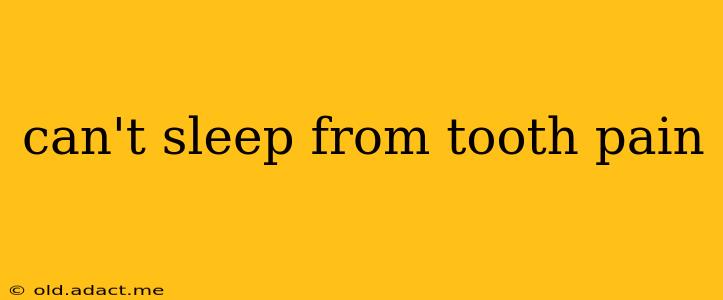Tooth pain that keeps you up at night is excruciating. The throbbing, sharp, or dull ache can leave you exhausted and frustrated, impacting your daily life. This comprehensive guide explores effective remedies for tooth pain that prevents sleep, along with crucial information on when to seek professional dental help.
What Causes Tooth Pain That Disrupts Sleep?
Several factors can contribute to tooth pain severe enough to interfere with your sleep. Understanding the underlying cause is the first step towards finding relief. Common culprits include:
- Dental Cavities (Dental Caries): Bacteria erode tooth enamel, leading to cavities that can cause intense pain, especially when exposed to hot, cold, sweet, or acidic foods and drinks.
- Abscessed Tooth: A bacterial infection at the root of the tooth can cause severe, throbbing pain that radiates throughout the jaw. This is a serious condition requiring immediate dental attention.
- Gum Disease (Periodontitis): Inflammation and infection of the gums can lead to pain, sensitivity, and even tooth loss.
- Cracked or Chipped Tooth: A fracture in the tooth, even a small one, can expose the sensitive dentin layer, triggering pain.
- Bruxism (Teeth Grinding): Grinding or clenching your teeth, often unconsciously during sleep, can wear down enamel, causing sensitivity and pain.
- Wisdom Teeth: Impacted or partially erupted wisdom teeth can cause significant pain and discomfort.
- Sinus Infection: While not directly related to the teeth, sinus infections can sometimes cause referred pain to the upper teeth.
Home Remedies for Tooth Pain Relief (Before Bed)
While home remedies offer temporary relief, they aren't a substitute for professional dental care. Here are some options that might help alleviate pain until you can see a dentist:
- Over-the-Counter Pain Relievers: Ibuprofen (Advil, Motrin) or acetaminophen (Tylenol) can help reduce pain and inflammation. Always follow the dosage instructions on the label.
- Saltwater Rinse: Dissolve ½ to ¾ teaspoon of salt in a cup of warm water and rinse your mouth gently several times a day. This can help clean the area and reduce inflammation.
- Cold Compress: Applying a cold compress to the affected area can help numb the pain and reduce swelling.
- Clove Oil: Clove oil has natural anesthetic properties. Apply a small amount directly to the affected tooth using a cotton swab (use with caution, as it can irritate sensitive gums).
- Avoid Irritants: Refrain from consuming hot, cold, acidic, or sugary foods and drinks that can aggravate the pain.
How Can I Get Rid of Tooth Pain Fast? (Addressing Urgency)
For immediate relief, the options mentioned above – over-the-counter pain relievers and cold compresses – are your best bet. However, if the pain is severe or doesn't respond to these measures, seeking professional dental attention is crucial. Delaying treatment can worsen the condition and lead to more significant problems.
What to Do if Tooth Pain Keeps You Awake at Night?
If tooth pain is preventing you from sleeping, try the home remedies mentioned earlier. However, prioritize getting a good night's sleep. If the pain is unbearable, consider taking your prescribed pain medication and applying a cold compress. If the pain persists, contact your dentist or an emergency dental clinic immediately. Do not wait until morning.
When Should I See a Dentist for Tooth Pain?
You should see a dentist immediately if you experience:
- Severe or persistent pain: Pain that doesn't respond to over-the-counter pain relievers.
- Swelling: Noticeable swelling in your face or jaw.
- Fever: A high temperature accompanied by tooth pain.
- Pus: Discharge of pus from around the tooth.
- Difficulty opening your mouth: Limited range of motion in your jaw.
These are all signs of a more serious dental issue that requires immediate attention.
Can Tooth Pain Be a Sign of Something Serious?
Yes, severe tooth pain can sometimes be a sign of a serious underlying condition such as an abscess, which can spread infection throughout the body if left untreated. Ignoring persistent tooth pain can have serious consequences.
Conclusion
Tooth pain that disrupts sleep is a serious issue demanding prompt attention. While home remedies can provide temporary relief, professional dental care is essential for diagnosis and treatment. Don't hesitate to contact your dentist immediately if you experience severe or persistent tooth pain, or any of the warning signs mentioned above. Your oral health is crucial to your overall well-being. Prioritizing dental care ensures you can get back to enjoying restful nights and a healthy smile.
